You might have heard this before: Too much cholesterol is bad for you.
So, you probably know that high cholesterol levels can have dangerous effects on your cardiovascular system and your heart.
But what if I told you that some of the good bacteria have can help you reduce your cholesterol levels? And that these bacteria would have another great benefit on your overall health.
Looks like another cool bacterial superpower to me!
Read on to learn about how bacteria in your gut can reduce your cholesterol levels.
Where does cholesterol come from?
Each cell in your body is surrounded by a membrane to keep the cell and all its content together. And most of these cell membranes have cholesterol in them to stabilise the membrane. Also, your body produces some hormones, vitamin D and bile acids from cholesterol. So in general, cholesterol is essential for us. We need it to survive.

The cholesterol in your body can have two origins. Either you take it up when you eat animal products or your liver makes cholesterol.
Independent on where the cholesterol comes from, it all lands in your intestinal tract. From here, the cholesterol is transported into the plasma or it is degraded into the inactive molecule coprostanol.
When a lot of cholesterol is circulating in your plasma, it can be bad for your health. This is why researchers have been looking for ways to lower the amount of cholesterol in the plasma.
And now, luckily, they found some special bacteria that can reduce the cholesterol in your gut.
Linking gut bacteria and cholesterol levels
As we’ve seen above, cholesterol passes through your gut. And we know that our guts are full of helpful bacteria. So, researchers thought that maybe bacteria have something to do with the varying cholesterol levels in our plasma. They just didn’t know how cholesterol levels and gut bacteria are linked.
A previous study looked at the Asian dish Tapai, which is fermented cassava or rice. A special Lactobacilli strain from this dish has probiotic effects in rats and can degrade cholesterol.
Now, a new study used a fancy technique called metagenomic analysis to find new bacteria that reduce our cholesterol levels. For this, the scientists took data from previous stool samples. And they analysed the levels of coprostanol in these stool samples and which genes they could find in those samples.
Luckily, with this metagenomic analysis, they could detect ALL genes in a sample. And these genes could come from any organism: the person from whom the sample comes from, but also bacteria, fungi or viruses.
So, they found that the samples with higher coprostanol and lower cholesterol levels had some unique bacterial genes. Genes, that they did not find in other samples.
They then worked their ways back and tried to name the bacteria to which the genes belonged. Apparently, in these stool samples lived bacteria that produced a lot of coprostanol from cholesterol.
But most of these bacteria were unknown. This means the scientists had never seen them before. Plus, they had no idea how to grow these bacteria in the lab.
Yet, they found one bacterium, that the scientists already knew. And they’ve seen in other studies that this bacterium is somehow linked to cholesterol degradation.
This bacterium’s name is Eubacterium coprostanoligenes.
Meet your new superbacterium – Eubacterium coprostanoligenes
With this new super bacterium showing up, the scientists obviously wanted to learn more about it.
The scientists showed that Eubacterium coprostanoligenes degrades cholesterol. For this, they grew the bacterium in the lab in similar conditions as the gut environment. And so they learned about every step of how Eubacterium coprostanoligenes degrades cholesterol.
Interestingly, the scientists also showed that Eubacterium coprostanoligenes is related to the bacteria Faecalibacterium prausnitzii, Clostridium leptum and Ruminococcus bromii. And these are some of the friendly bacteria living in our gut.
Gut bacteria reduce cholesterol levels
After the scientists learned about which bacteria are our new superheroes, they wanted to prove that these gut bacteria can indeed reduce our cholesterol levels.
So, they used fresh stool samples and covered them with lots of cholesterol in the lab. After 4 days, in some of these samples, the cholesterol was degraded to coprostanol. And they found bacteria that had the same cholesterol-degrading gene that Eubacterium coprostanoligenes uses to degrade cholesterol.
But they also found that some samples had higher amounts of cholesterol. In here, now bacterium degraded the cholesterol. And similarly, scientists did not detect that gene and thus no bacteria that degrade cholesterol.
Lastly, the scientists needed to check whether cholesterol degradation also means lower cholesterol levels in the plasma of a person. For this, they looked at data from other studies. And yes, they found that people with lower cholesterol levels in their serum have bacteria in their guts that degrade the cholesterol.

So, with these data, scientists thought that some people carry special bacteria in their guts. When we eat cholesterol, it lands here as well. The bacteria then degrade the cholesterol so that less cholesterol is transported from the gut to the plasma. Therefore, these people have lower cholesterol plasma levels.
Now we know that certain bacteria can degrade cholesterol and produce coprostanol. However, we do no know yet what happens to the coprostanol. But I am sure they will find out soon.
Be nice to your bacteria – they reduce your cholesterol
As I cannot state it enough: Be nice to your bacteria.
They might help you in ways you did not even think about before. Now, we know that bacteria maybe even impact our health by keeping cholesterol levels low. This would generally improve our cardiovascular systems.
So thank your new friend Eubacterium coprostanoligenes and start being nice to it too!

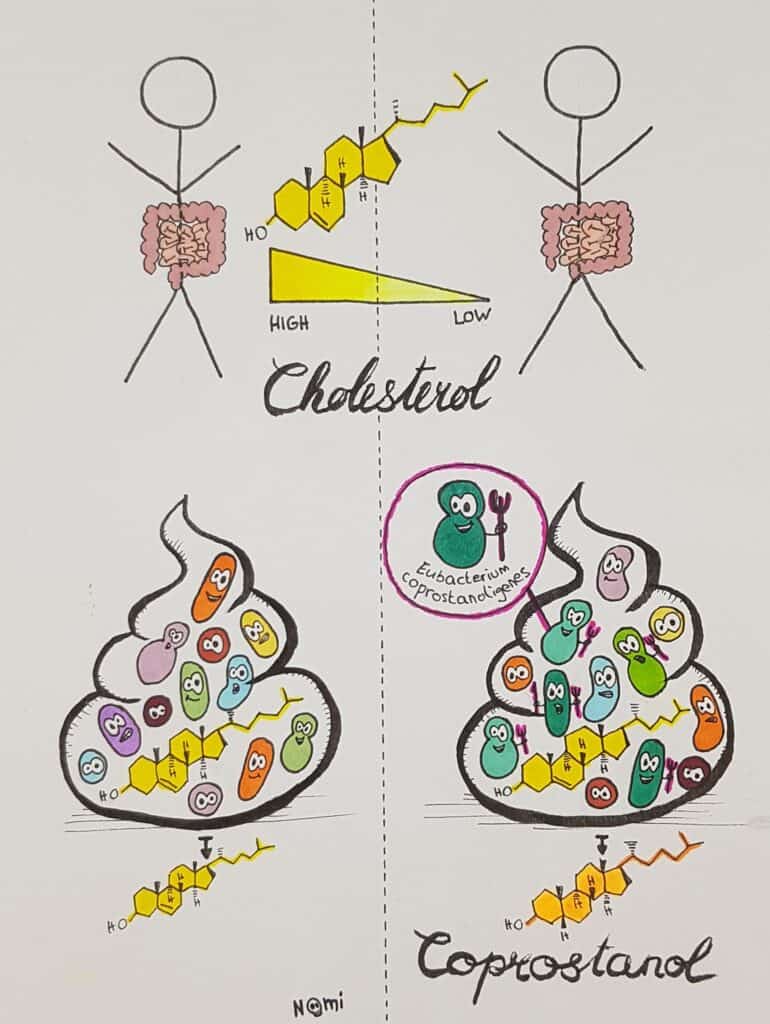
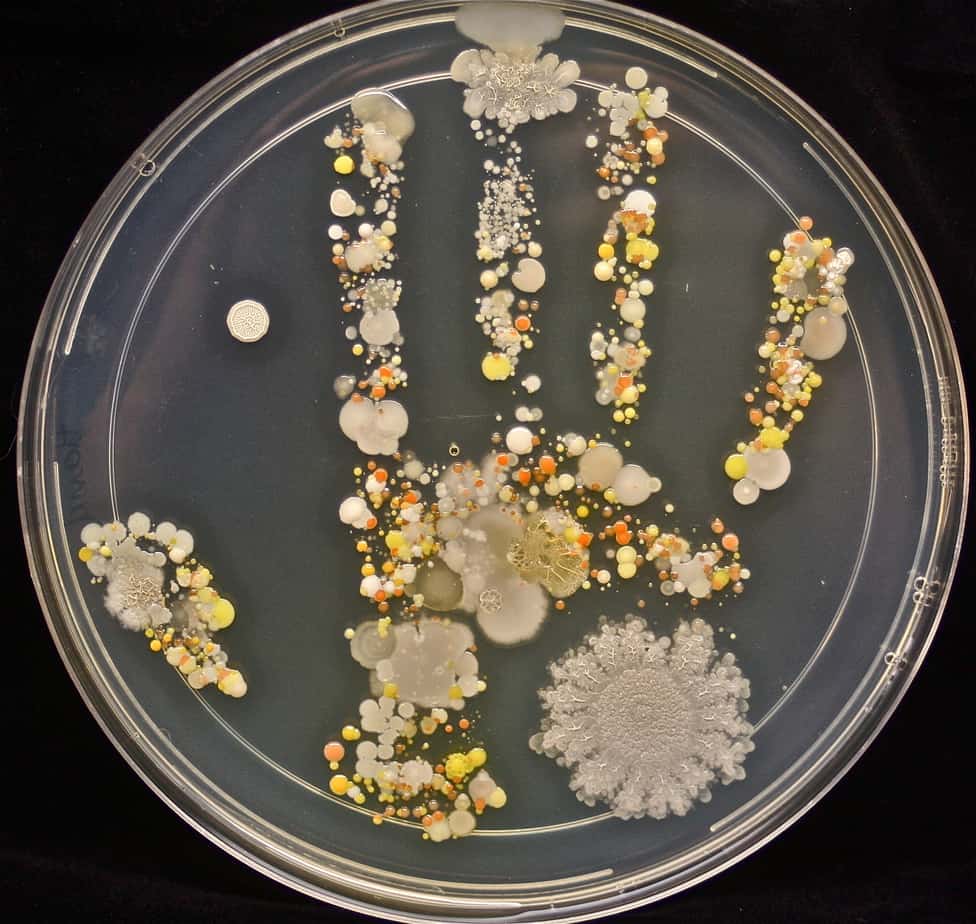
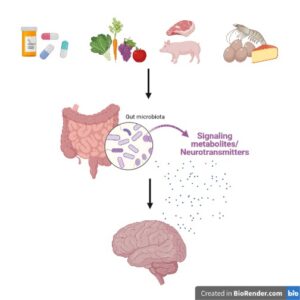
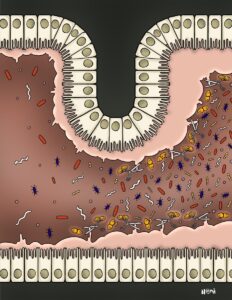



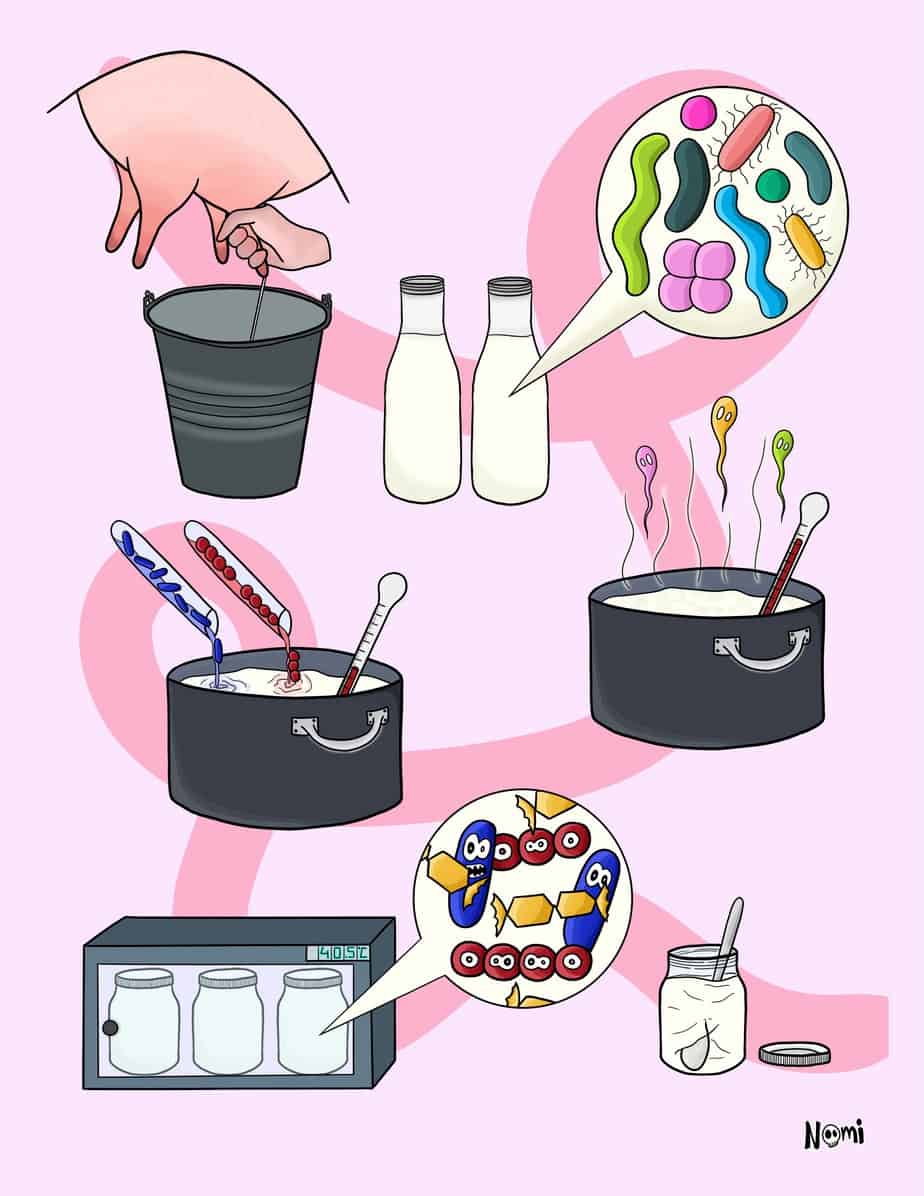

18 Responses
No
Sorry, why no?
Very good
Thank you! :)
So what foods or commercial probiotics should we consume to reduce cholesterol? I have a strong interest in this. I have a family history of heart disease including a son who had a heart attack at age 38. I’ve had a heart attach, triple CABG, four stents, and now have a 35 percent blockage in one of the grafts. I’ve taken EVERY statin. Each caused severe muscle weakness and increased blood sugar but barely reduced my cholesterol. Zetia didn’t work either. Last year, I took Repatha for eight months. It did lower my cholesterol to normal but caused muscle pain and spasms, muscle weakness, cognitive impairment, and insulin dependent diabetes.
Hello, thank you for your comment. I am afraid, I am not able to answer your question, but would refer you to a practitioner for that.
The ultimate would be a fecal transplant. This transplant is proving to cure a lot of disease. That said, the FDA has now banned all, except for uncontrollable C Dif. Infections because 1, one person has died. Lol. Sounds like Big Pharma is scared of lost profits. Do yourself a favor and Google DIY Fecal Translants. Forget western medicine ran by Big Pharma. They want you perfectly diseased to maximize profits.
Would you guys want to learn more about faecal transplants?
It seems your best bet is to search online for a rice or cassava/yuca Tapai recipe. It’s not hard to make and you can find the Ragi yeast to purchase online as well.
Here’s a link for a Rice Tapai recipe:
https://www.culturesforhealth.com/learn/recipe/soy-recipes/tapai-fermented-rice/
Good luck!
Thanks for sharing this. It looks really good and worth trying out! :)
There is alot of information regarding our health and our gut. Our brain and our gut are best friends. It is amazing that these studies are happening. Studying gut bacteria can and will help humans with many current health problems. These studies explain what we have ignored for too many years! YOU ARE WHAT YOU PUT IN YOUR BODY❤️
Yes, I agree. There is so much that we still don’t know and understand. So, research into this field is super important.
I would appreciate the name of a practitioner who can tell me how to get this bacteria into my gut.
Hi, thanks for your comment. I am sorry to hear about your health issues, it does sound incredibly troublesome. However, I am in no way an expert in that field and cannot judge your metabolic problems that lead to high cholesterol levels. So, maybe talk to a practitioner about this study and see what they think about it and how they might be able to administer it to you.
Good article!
What do you think about Red Rice Yeast
https://www.nccih.nih.gov/health/red-yeast-rice
like a prebiotic?
Hey Rafael, thanks for your comment.
I have not heard of Red Rice Yeast before, but you might just go with what the FDA published about this topic.
I think we need simplified clarification of what is given to poof the health real status, you are well appreciated , but not all people can understand, me a doctor may evaluate &pick the truth, but these are inreasing &dieting ( meaning you follow natural things to eat , reduce salt, sugar , increase natural fibers ), anyhow you are doing nice best regards with thanks.
Thank you for your comment :)